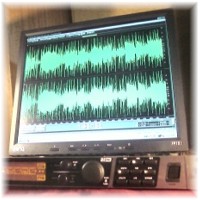


Taking your mix to the next level with Mastering
Mastering has been defined as 'the magical step that transforms your pumpkin into a carriage'. We accomplish this through the use of EQ, compression, reverb and final master limiting. Those who do mastering for a living and do it well are held in high esteem in recording circles; and with good reason. Their craft is largely misunderstood, and efforts to duplicate at home what they do in professional mastering houses are often disastrous. Still, there is hope. With dedication and determination, the home hobbyist can achieve reasonable results in adding polish to their masterpiece. Thus, evermore determined, we forge ahead... As you continue your digital recording education, you'll find that mastering tends to be more art than science. Yes, there are plug-ins and programs that claim to automate the process; and many are helpful in adding sparkle to your final mix. But nothing replaces knowledge, patience, training, and attention to detail. As we expand our ear training to include the subtleties of the mastering process, one exercise continues to prove especially helpful:
Unlike the mixing phase where you tweak a track/group at a time, changes made during the mastering phase impact all tracks in the song. For this reason, you gotta be careful and move slowly. Document your changes, take frequent breaks to rest your ears, and use those reference tracks as a reality check. Generally, EQ, compression, reverb, and final limiting are added during the mastering phase (not always in that order). In talented hands, EQ can help give separation to individual instruments and create an overall pleasant blend. Certainly, separation is easier to achieve during the mixing phase when you're working with individual tracks. Care should be taken, then, to accomplish as much of this during the mixing phase as possible. Still, much can be done during mastering. Also, a high-pass filter to remove rumbling low end is usually appropriate. Now is a good time to A/B your work to a commercial CD of a similar genre. And don't forget to switch to mono occasionally to catch phasing problems. Proper compression settings can bring life to an otherwise ordinary mix. Use of a multi-band compressor can give you more flexibility and power in doing so. Adding a touch of reverb often helps add continuity to a project. Keeping in mind what we learned about placing instruments in the proper room setting will help you choose an appropriate verb. Just remember to keep it light. Another challenge in mastering is getting a dozen or so songs to sound like they belong together. The mastering engineer has the responsibility of knitting 12 unique songs into a cohesive whole. Remember that each song performs a role within the overall plan of a CD. In the same way that a soft section in a song helps make a loud section seem louder, a soft acoustic song which forces the listern to sit up and listen can add impact to the raucous rock song that follows. Resist the temptation to over-compress every song in an effort to make them as loud as possible. Softer songs benefit from a higher dynamic range. So, plan to apply different compressor, EQ, and verb settings to your 12 songs. THEN, you can link them together and render a single WAV file. Once rendered as a single file, you can crop the beginning and fade (if appropriate) the end. Then you're ready to apply the final (and gentle) limiting to the very peaks. Try a 2:1 ratio with a high threshold. Take a break; you deserve it. Besides, you'll want to refresh your ears and then go back and double-check your work. Reference Materials:
Home ~ Getting Started ~ Recording ~ Mixing ~ Mastering ~ Promotion ~ Troubleshooting ~ Contact Us  If you have a question about Audio, please Visit Our Forum: Audiominds.com Forum. Copyright © 2003 www.AudioMinds.com All Rights Reserved. |